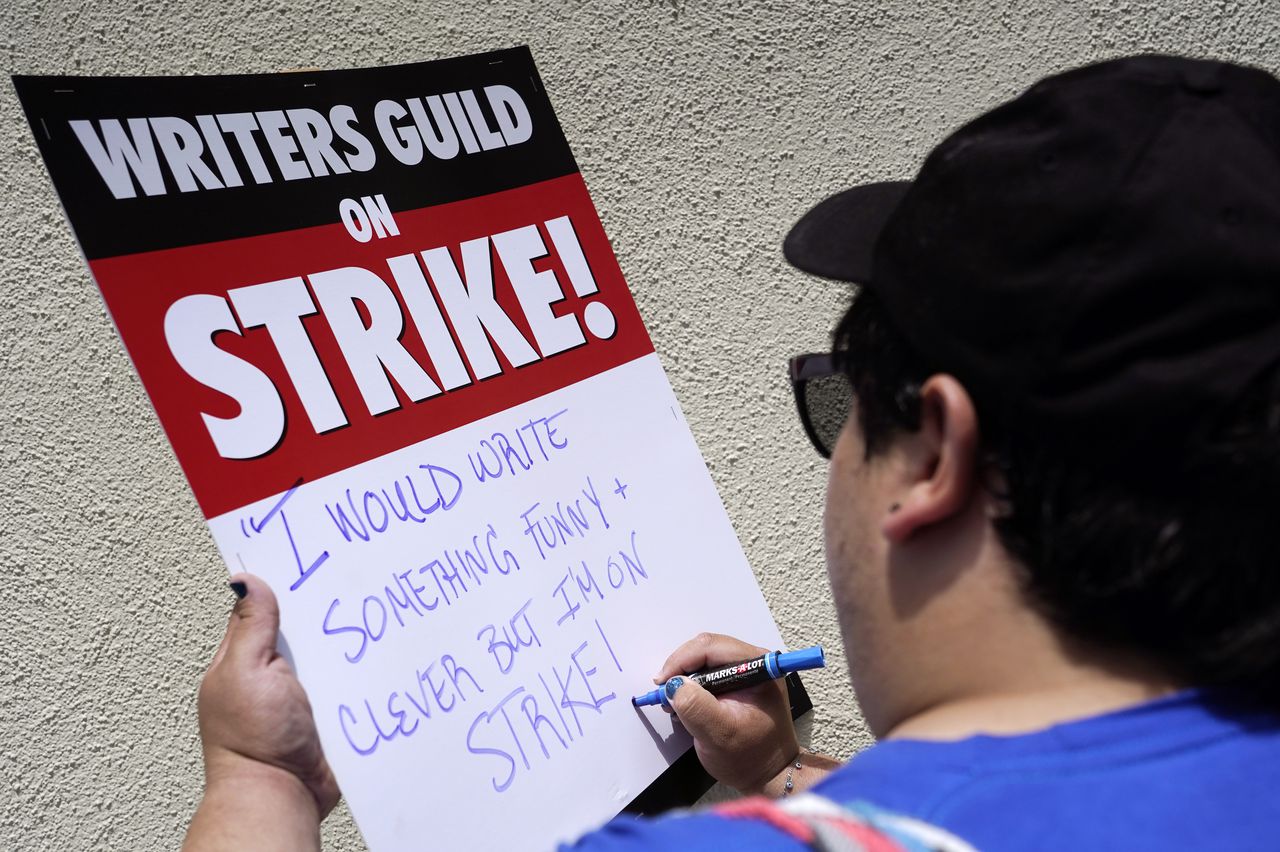What to know about the WGA strike that has writers picketing in Hollywood and New York
The last Hollywood writers’ strike happened back in 2007, when writers fought for better compensation for their work that went to DVDs and iTunes downloads.
Now, concerns over AI creating content and inequitable residuals by streaming services are among many of the factors that have pushed a strike to happen again.
The three-year film and TV contract between the Writers Guild of America (WGA) and the Alliance of Motion Picture and Television Producers (AMPTP), which represent Hollywood studios, expired at midnight Tuesday.
Neither party came to an agreement on better compensation, improved working conditions, and limits on the use of AI by the deadline, prompting WGA members to go on strike.
Writers have been subjected to extremely low residuals, which are compensation by networks or other places that re-air an episode or film they wrote.
Previously, writers would receive half of their fee whenever a network re-airs a program. Now, they only get 5.5 percent of their writing fee when episodes are sold to streamers like Amazon and Netflix.
Streamers also asked for fewer episodes per season compared with broadcasters like ABC and CBS. Rather than the 22 episodes that would run on network TV, studios are asking for series that last up to 10 episodes per season. This means less work and less money for writers.
Additionally, writers are asked to work for free in what are called “mini rooms” that involve them working alone on scripts that may or may not be greenlit. Mini rooms don’t guarantee that writing will be used in an official writers room even if the show does get picked up.
All of which WGA argues aren’t sustainable conditions for economic security.
WGA actions are scheduled for the entire week across the country’s west and east coasts. And picketing began Tuesday afternoon in front of studios represented by AMPTP. They include Netflix, Amazon, Apple, Disney, Discovery, Warner Brothers, NBC Universal, Paramount and Sony.
These studios have been under pressure to cut costs and slash production budgets since last year.
According to THR, Netflix saw a dramatic stock fall in April 2022 and experienced its first subscriber loss in over a decade. Wall Street’s “ensuing reevaluation” of streaming sites’ profitability led to mass layoffs across Disney, Paramount Global, Amazon and Netflix.
The merger between Warner Brothers and Discovery accumulated $50 million in debt to finance it, leading Warner Brothers to chase $3.5 billion worth of cost-savings.
But writers are still expected to meet soaring creative expectations and produce quality content as companies continue to cut costs under inflation and fears of a possible recession.
“It’s really the same thing that’s happen in every industry: cut the budget you spend on labor, and all the money flows upwards away from the people who are actually making the thing that’s making the money,” tweeted Ashley Nicole Black, a writer for Apple’s Ted Lasso and HBO’s A Black Lady Sketch Show.
According to a recent “State of the Industry” report by WGA, the entertainment industry has increased its total revenue from $155 billion to $220 billion in the past decade, despite short-term profit for companies’ investment in streaming.
“We’re here to prove that this industry doesn’t function with our LABOR! So don’t undermine that,” tweeted Los Angeles based writer and director and WGA Captain, Caroline Renard. “They don’t get to say [no] to basically all of our demands and still get to “jump on a call real quick “can we adjust that scene.” NO!”
In a statement released late Monday night, WGA said the studios’ response to writers’ demands have been “wholly insufficient, given the existential crisis writers are facing.”
In a statement to NPR, AMPTP said it had presented a package proposal to the guild “which included generous increases in compensation for writers as well as improvements in streaming residuals.”
But key sticking points of “mandatory staffing” and “duration of employment” insisted by the WGA was something the AMPTP could not meet because, the trade association claims, “that would require a company to staff a show with a certain number of writers for a specified period of time, whether needed or not.”
Viewers may not see immediate effects of this strike on most TV shows or streaming series. But audiences tuning in tonight or this weekend will notice a change on late night talk shows and Saturday Night Live, as those writers will not be working.
“Jimmy Kimmel Live!” and “The Late Show with Stephen Colbert” will begin airing repeat episodes on Tuesday. Seth Meyers and Jimmy Fallon, who host NBC’s “Late Night with Seth Meyers” and “The Tonight Show” respectively, previously said they would honor the strike and not air new episodes.
